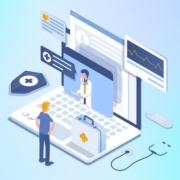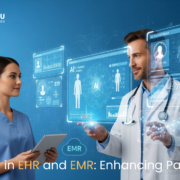How Generative AI Is Powering the Next Wave of Healthcare Software
The healthcare industry is experiencing a technological revolution, with artificial intelligence at its core. Among emerging AI technologies, generative AI healthcare software is leading the next wave of innovation. By leveraging AI models that can generate insights, synthesize data, and even propose treatment options, healthcare providers can deliver smarter, faster, and more personalized care. Understanding the types of healthcare software enhanced by generative AI is crucial for organizations aiming to adopt advanced digital solutions.
How Generative AI is Transforming Healthcare Software
Generative AI is changing how healthcare systems operate, making software more intelligent, adaptive, and patient-focused. Here are some key areas of transformation:
1. Personalized Patient Care
Generative AI enables healthcare software to analyze individual patient data and generate customized care plans. By examining medical histories, genetic data, and lifestyle factors, AI-driven systems provide recommendations tailored to each patient’s unique profile. This personalization leads to improved outcomes, better adherence to treatment plans, and higher patient satisfaction.
2. Automation of Medical Processes
Repetitive administrative and clinical tasks can now be automated using generative AI. Scheduling, billing, prescription refills, and even preliminary diagnostics can be handled by AI-powered bots, freeing clinicians to focus on critical care. This automation improves efficiency, reduces errors, and streamlines hospital workflows.
3. Data-Driven Clinical Decisions
Healthcare providers face massive amounts of patient data daily. Generative AI healthcare software can analyze complex datasets, identify patterns, and generate actionable insights. From predicting disease progression to suggesting optimized treatment protocols, AI enhances decision-making and supports evidence-based medicine.
Types of Healthcare Software
Generative AI is enhancing a wide spectrum of healthcare solutions. Understanding the types of healthcare software can help providers select the right tools for their needs:
i. EHR and EMR Systems
Electronic Health Records (EHR) and Electronic Medical Records (EMR) are central to clinical operations. Integrating generative AI into these systems allows for automatic summary generation, predictive health insights, and intelligent data organization, improving both clinical and administrative efficiency.
ii. Telemedicine and Remote Monitoring Tools
Telemedicine platforms and remote monitoring devices have become essential for patient care beyond hospital walls. Generative AI can analyze patient-reported data from wearable devices, detect anomalies, and provide early alerts to clinicians, enhancing remote patient management.
iii. AI-Powered Diagnostic Software
From radiology to pathology, AI-driven diagnostic tools can generate interpretations of imaging data, lab results, and genomic information. These tools augment clinicians’ expertise, enabling faster, more accurate diagnoses while reducing the risk of oversight.
Benefits of Generative AI Healthcare Software
Adopting generative AI healthcare software offers multiple advantages:
- Enhanced Accuracy: AI reduces errors in diagnostics and treatment recommendations.
- Improved Efficiency: Automation of repetitive tasks accelerates clinical workflows.
- Personalized Care: Tailored treatment plans improve patient outcomes.
- Data-Driven Insights: Predictive analytics guide better clinical and operational decisions.
- Cost Savings: Optimized processes and reduced redundancies lower operational costs.
These benefits make generative AI a critical component of modern healthcare infrastructure.
Future of Healthcare Software with AI
The future of healthcare software is tightly intertwined with AI advancements. Emerging trends include:
- Hyper-Personalized Medicine: AI will tailor interventions to individual patients based on multi-dimensional data.
- Predictive Population Health: Generative AI will identify trends and risks across patient populations.
- Seamless Integration: AI-powered tools will integrate across EHRs, telemedicine platforms, and diagnostic systems.
- Continuous Learning Systems: Software will evolve by learning from real-world patient outcomes, improving over time.
Implementing these innovations requires collaboration with specialized healthcare software development services to ensure secure, scalable, and compliant solutions.
Conclusion / Call-to-Action
Generative AI healthcare software is revolutionizing patient care, clinical decision-making, and operational efficiency. By integrating AI into various types of healthcare software, providers can deliver smarter, faster, and more personalized care. For organizations looking to harness the power of AI in healthcare, partnering with experienced Healthcare Software Development Services ensures the deployment of secure, scalable, and innovative solutions. Embrace the future of healthcare today by exploring AI-driven software solutions that transform how care is delivered.


